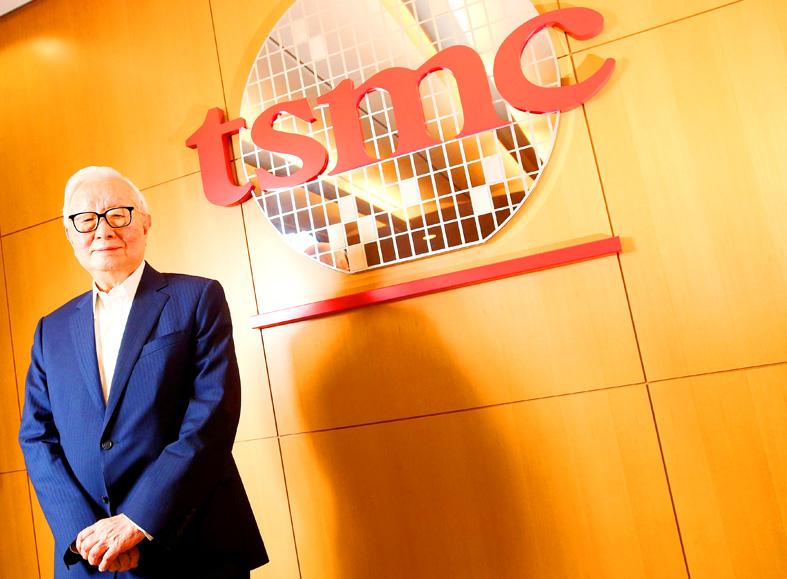The US’ efforts to increase onshore manufacturing of semiconductors is wasteful and an expensive exercise in futility due to a lack of manufacturing talent and high costs, Taiwan Semiconductor Manufacturing Co (TSMC, 台積電) founder Morris Chang (張忠謀) said on Tuesday.
Chang made the remarks in an interview with the Brookings Institution in its latest podcast on the theme “Can semiconductor manufacturing return to the US?”
The semiconductor veteran said that the US today still has a good position in the semiconductor technology industry in terms of chip design capacity, but it lacks sufficient manufacturing talent.

Photo: Reuters
“I don’t really think it is a bad thing for the US actually. But, it’s a bad thing for trying to do semi manufacturing in the US,” Chang said.
The US used to have strong talent, like Taiwan does now, he said.
However, after the 1970s, young talent in the US migrated to high-paying professions such as finance or consulting, rather than working for technology companies such as GE or IBM, he said.
Since then, US companies just could not get enough business school graduates, he added.
Another challenge is high manufacturing costs, Chang said.
For example, TSMC thought that its factory in Oregon, which was established in 1997, would have costs comparable to Taiwan, but that assumption was proved to be “naive,” he said.
TSMC has attempted to improve the factory’s performance by changing managers and engineers, he said.
While a few years of effort did improve the factory’s performance, the difference in cost between the US and Taiwan remains almost the same, he added.
Chips made at the Oregon factory cost 50 percent more than those make TSMC’s factories in Taiwan, Chang said.
Regarding TSMC’s new US$12 billion factory in Arizona, Chang said he had retired by 2019, but that chairman Mark Liu (劉德音) made the decision at the insistence of the US government.
TSMC, the sole chip supplier for Apple Inc’s iPhones, has said the Arizona factory is under construction, but aims to manufacture 5-nanometer chips by 2024.
Commenting on the US government’s efforts to increase onshore chip manufacturing by spending tens of billions dollars, Chang said: “I think it will be a very expensive exercise in futility.”
“The US will increase onshore manufacturing of semiconductors somewhat,” Chang said. “All that will be at a very high cost increase, high unit costs, but non-competitive in the world market when you compete with factories like TSMC.”
Regarding Intel CEO Pat Gelsinger’s remarks that “Taiwan is not safe,” Chang said he assumes that there will not be a war.
“If there is no war, then I think the efforts to increase onshore manufacturing of semiconductors is a wasteful and expensive exercise in futility," he said. “If there is a war, we all have a lot more than just chips to worry about.”

POWERING UP: PSUs for AI servers made up about 50% of Delta’s total server PSU revenue during the first three quarters of last year, the company said Power supply and electronic components maker Delta Electronics Inc (台達電) reported record-high revenue of NT$161.61 billion (US$5.11 billion) for last quarter and said it remains positive about this quarter. Last quarter’s figure was up 7.6 percent from the previous quarter and 41.51 percent higher than a year earlier, and largely in line with Yuanta Securities Investment Consulting Co’s (元大投顧) forecast of NT$160 billion. Delta’s annual revenue last year rose 31.76 percent year-on-year to NT$554.89 billion, also a record high for the company. Its strong performance reflected continued demand for high-performance power solutions and advanced liquid-cooling products used in artificial intelligence (AI) data centers,

SIZE MATTERS: TSMC started phasing out 8-inch wafer production last year, while Samsung is more aggressively retiring 8-inch capacity, TrendForce said Chipmakers are expected to raise prices of 8-inch wafers by up to 20 percent this year on concern over supply constraints as major contract chipmakers Taiwan Semiconductor Manufacturing Co (TSMC, 台積電) and Samsung Electronics Co gradually retire less advanced wafer capacity, TrendForce Corp (集邦科技) said yesterday. It is the first significant across-the-board price hike since a global semiconductor correction in 2023, the Taipei-based market researcher said in a report. Global 8-inch wafer capacity slid 0.3 percent year-on-year last year, although 8-inch wafer prices still hovered at relatively stable levels throughout the year, TrendForce said. The downward trend is expected to continue this year,

A proposed billionaires’ tax in California has ignited a political uproar in Silicon Valley, with tech titans threatening to leave the state while California Governor Gavin Newsom of the Democratic Party maneuvers to defeat a levy that he fears would lead to an exodus of wealth. A technology mecca, California has more billionaires than any other US state — a few hundred, by some estimates. About half its personal income tax revenue, a financial backbone in the nearly US$350 billion budget, comes from the top 1 percent of earners. A large healthcare union is attempting to place a proposal before

Vincent Wei led fellow Singaporean farmers around an empty Malaysian plot, laying out plans for a greenhouse and rows of leafy vegetables. What he pitched was not just space for crops, but a lifeline for growers struggling to make ends meet in a city-state with high prices and little vacant land. The future agriculture hub is part of a joint special economic zone launched last year by the two neighbors, expected to cost US$123 million and produce 10,000 tonnes of fresh produce annually. It is attracting Singaporean farmers with promises of cheaper land, labor and energy just over the border.